افتتح سادس مخيم للاجئين السوريين في الأردن في الثلاثين من الشهر الماضي. ويقع هذا المخيم، الذي ستصل سعته إلى 130 ألف لاجيء، قرب مدينة الأزرق على بعد مئة كم من عمان، ويتوقع أن يصبح ثاني أضخم مخيم للاجئين في المملكة بعد مخيم الزعتري.
بدأ وصول اللاجئين إلى مخيم الأزرق قبل أسبوع من الافتتاح الرسمي. عند الافتتاح، كان هنالك ما يقارب مئة لاجيء، ووصل هذا العدد اليوم بعد أقل من أسبوعين من الافتتاح إلى ٢,٥٠٠ سوري.
وأكد أندي نيدهام، مسؤول العلاقات الخارجية لمخيم الأزرق، أن تأسيس هذا المخيم جاء استجابة لازدياد الضغط على مخيم الزعتري، والذي قارب على الامتلاء، بحسب قوله.
ابتداءً من الأول من ايار، سيتم تحويل اللاجئين السوريين إلى مخيم الازرق، ما لم يكن لهم أسرة أو صلة ما في مخيم الزعتري. وقد يحوّل اللاجيء إلى مخيم الزعتري إذا ما كان يعاني من حالة طبية معينة، نظراً لأن مستشفيات مخيم الأزرق لا تزال قيد الانشاء والتجهيز.”
جاء ذلك بمثابة مفاجأة لكثير من السوريين الذين توقعوا أن يتم لم شملهم مع أفراد أسرهم في الزعتري، الذين كانوا قد فروا من قبلهم عبر الحدود السورية الأردنية.
أم ميلاد ، من درعا، عبّرت عن خيبة أملها لأنها توقعت أن يتم إرسالها إلى الزعتري حيث يقطن والديها منذ عام. الكثير من اللاجئين في مخيم الأزرق لهم أقرباء في مخيم الزعتري أو في المجتمعات المحلية في الأردن. وعلى الرغم من أن معظم اللاجئين فروا من ديارهم بسبب تدهور الوضع الأمني، إلا أن بعضهم قال أن الوضع الاقتصادي المزري في سوريا كان سبباً لخروجهم من وطنهم.
استغرقت رحلة اللاجئين إلى الأردن ما بين ثلاثة و١٨ يوماً، بحسب قولهم. على عكس الزعتري، الأزرق يقع بعيدا عن الحدود السورية الأردنية.
و لكن المشقة الحقيقية تكمن في رحلة الخروج من سوريا، حيث قال معظم اللاجئين الذين تحدثنا إليهم بأنهم اضطروا لدفع رسوم تتراوح بين 200 دولار – 600 دولار عن كل راكب لغرض تهريبهم خارج البلاد. ولكن هذا لا يمنع السائقين من مخالفة الاتفاق وطلب المزيد من المال في منتصف الرحلة من أجل إختصار الطريق. وقال العديد من السوريين أنهم لم يتناول الطعام أو الماء لعدة أيام خلال الرحلة، وذلك إما بسبب طول مدة الرحلة ونفاذ المؤن أو سرقة ممتلكاتهم على الطريق.
حارات بيوت الألمنيوم في مخيم الأزرق مقسمة حسب المحافظات السورية التي ينتمي إليها اللاجئون. اعتمدت إدارة المخيم هذا التقسيم لأن العائلات التي تأتي من نفس المكان عادةً تفضل أن تسكن مع بعضها.
“هذه الطريقة قد تساعد اللاجئين على التأقلم، وتعطي إحساساً بالعائلة والمجتمع بشكل أكبر،” يقول نيدهام. “اكتشفنا من تجربتنا في مخيم الزعتري أن هناك قابلية أكثر للناس أن تعتني بالخدمات مثل الحمامات وأماكن الغسيل إذا كانوا يتشاركون باستخدامها مع أناس يعرفونهم.”
في الوقت الذي ما تزال فيه معظم بيوت المخيم فارغة، فإن أولئك الذين وصلوا إليه ما زالوا في مرحلة تحديد علاقتهم بالمكان من حولهم والتعافي من عناء رحلتهم عبر الحدود. معظم الناس هناك لم يجلبوا معهم أي شيء باستثناء قصصهم حول أسباب وطريقة هروبهم إضافة الى آمالهم بأن تكون لجوءهم مؤقتاً. رفض معظم الأشخاص الذين تحدثنا إليهم أن يظهروا وجوههم أو أن نلتقط لهم صورا فوتوغرافية، وذلك حرصاً على سلامة من تركوهم من عائلاتهم خلفهم في سوريا. هذه الصور تحاول أن تروي جزءاً من حكايات هؤلاء الأشخاص وأن تعطي فكرة عن حياتهم في منازلهم الجديدة.
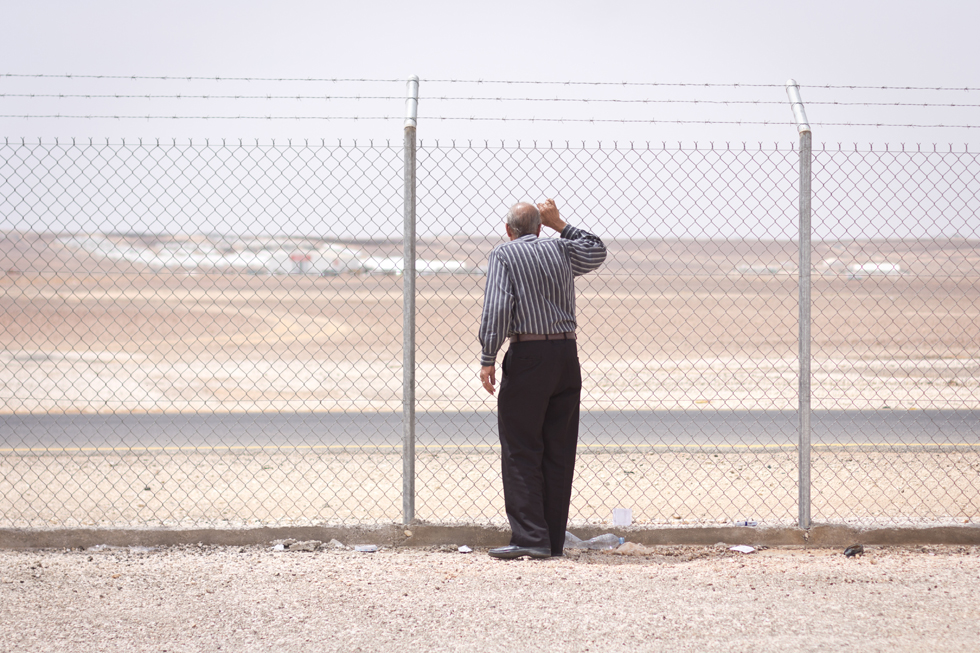
Syrian man looks out at the camp from the visiting area.
رجل سوري ينظر إلى المخيم وهو داخل منطقة الزيارة
By Sara Obeidat and Hussam Da’anah
Jordan inaugurated its sixth camp for Syrian refugees on April 30th. Located in the North East part of Jordan, around 100 km from Amman, Azraq camp is expected to become the second largest Jordanian refugee camp after Zaatari, eventually hosting around 130,000 people.
Refugees began arriving a week before the camp officially opened. There were about 100 refugees when the camp first opened. Less than two weeks later, the camp now hosts around around 2,500 refugees. “The decision was taken to open Azraq camp in order to decrease pressure on Zaatari which has been approaching capacity level,” said Andy Needham, External Relations Officer at Azraq camp. “Since the 1st of May, refugees will be directed to Azraq camp unless they either have direct nuclear family in Zaatari, or a medical reason considering the hospitals in Azraq are still not fully up to speed.”
This came as a surprise to many Syrians who expected to be reunited with their family members who fled before them across the Jordanian Syrian border. Um Milad, a Syrian woman from Daraa, expressed her disappointment as she expected to be sent to Zaatari where her parents have been living for the past year. Many of the refugees in Azraq either have family in Zaatari or in the host communities, and although most of the refugees fled due to the deteriorating security situation, a few also said that the declining economic circumstances was a reason for their exodus from Syria.
It took most refugees between three and 18 days to get to the camp. Unlike Zaatari, Azraq is located far away from the Jordanian Syrian border. The true hardship lies in the journey to get outside of Syria, where almost all the refugees we spoke to said they had to pay their drivers a fee ranging from $200 -$600 per person to “smuggle” them outside of the country. Very often the drivers would promise their passengers to arrive in a certain amount of time, but then ask for more money in the middle of the journey in order for them not to prolong it. Many Syrians said they went for days without food or water either because their supplies ran out while the journey took longer than expected, or because their belongings got stolen on the way.
Azraq camp is divided into neighborhoods of aluminum shacks, and Syrians are mostly assigned to a block or neighborhood based on where they’re from, in order for families and extended families from the same area to live close to each other. “This is an attempt to help people settle in, and it gives them a better sense of family and community,” said Needham. “Based on our experience in Zaatari, people are more likely to take better care of the facilities such as the toilets and washrooms because they will be sharing them with people they know.”
While most of the camp is still unoccupied, those already there have yet to establish their relationship with the space as they attempt to recover from their journey across the border. Most people brought almost nothing with them except for stories of why they left and how they escaped, as well as hopes to leave the camp eventually. Many of the people we spoke to refused to show their face or be featured in a photograph, as they feared for the safety of their family members that remain in Syria. This photo essay attempts to retell some of their stories as well as give an idea of what life is like in their new homes.
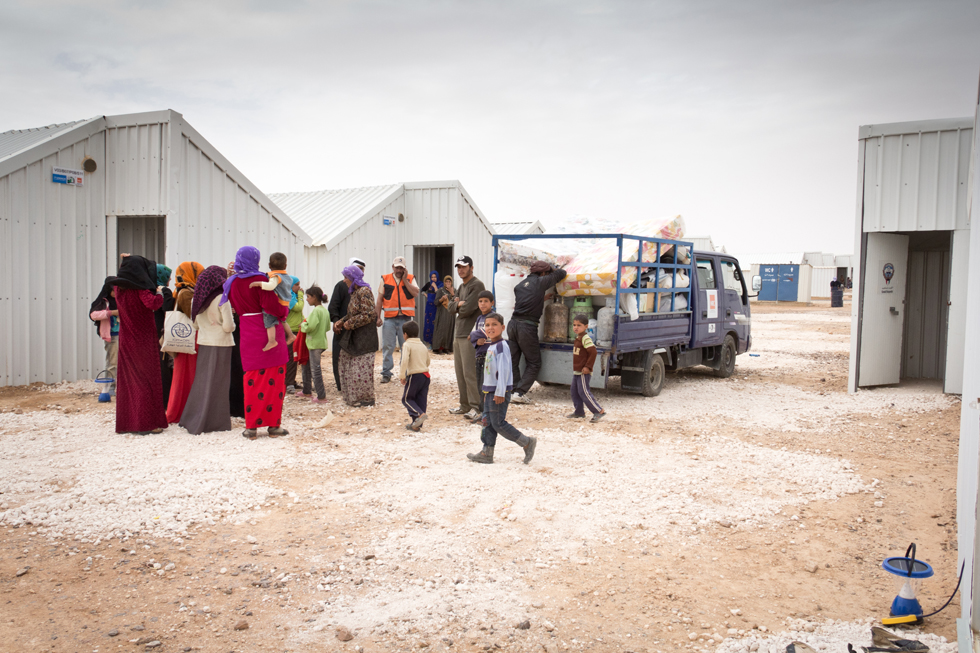
Mohammad Al Sarhan’s family arrives to the camp from Idlib after a five day journey. Mohammad and his 17 family members are shown to their new home.
عائلة محمد السرحان تصل إلى المخيم قادمةً من ادلب بعد رحلة خمسة أيام. محمد وعائلته المكونة من ١٧ فرد يتعرفون على منزلهم الجديد.
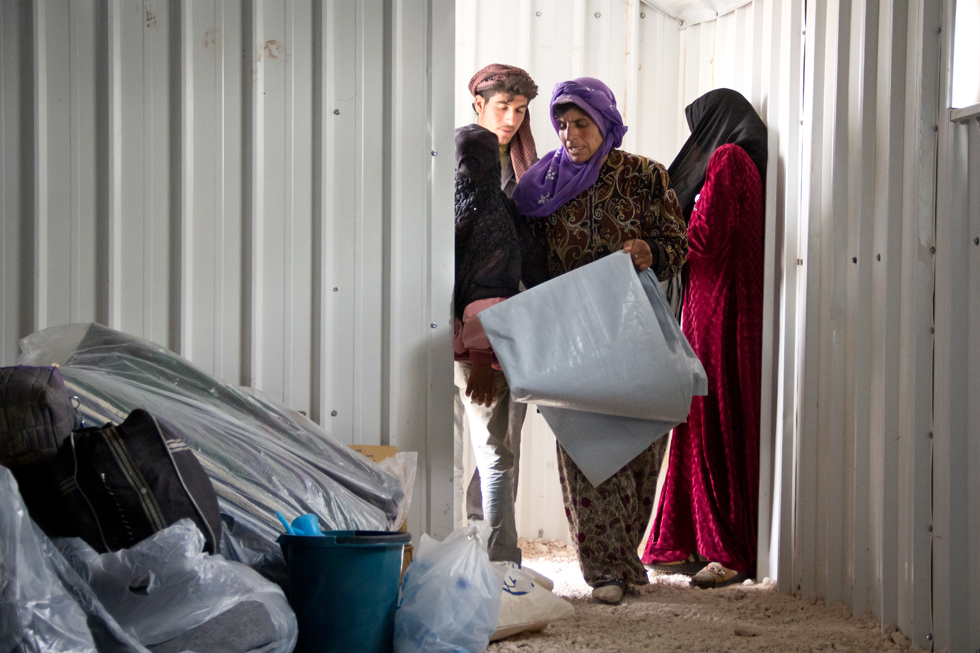
Mohammad’s family when they first enter their new home.
أفراد من أسرة محمد أثناء دخول بيتهم الجديد لأول مرة.
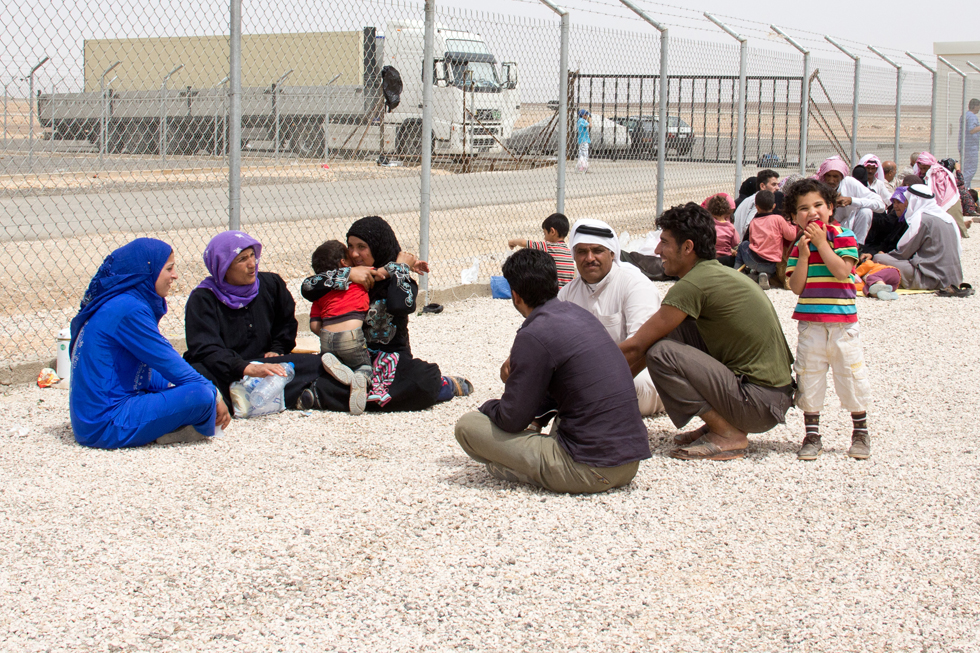
Mohammad and his extended family reunite in the visiting area after a three-year separation. Mohammad’s extended family members live in Mafraq and hope to apply for family reunification so he can move to Mafraq as well.
بعد فراق ثلاثة سنوات، محمد يلتقي بعائلته الذين يسكنون في المفرق، في ساحة الزيارة. ستحاول عائلة محمد أن تقدم طلب لم شمل لأجله ولأجل جميع أفراد عائلته الموجودين في المخيم.
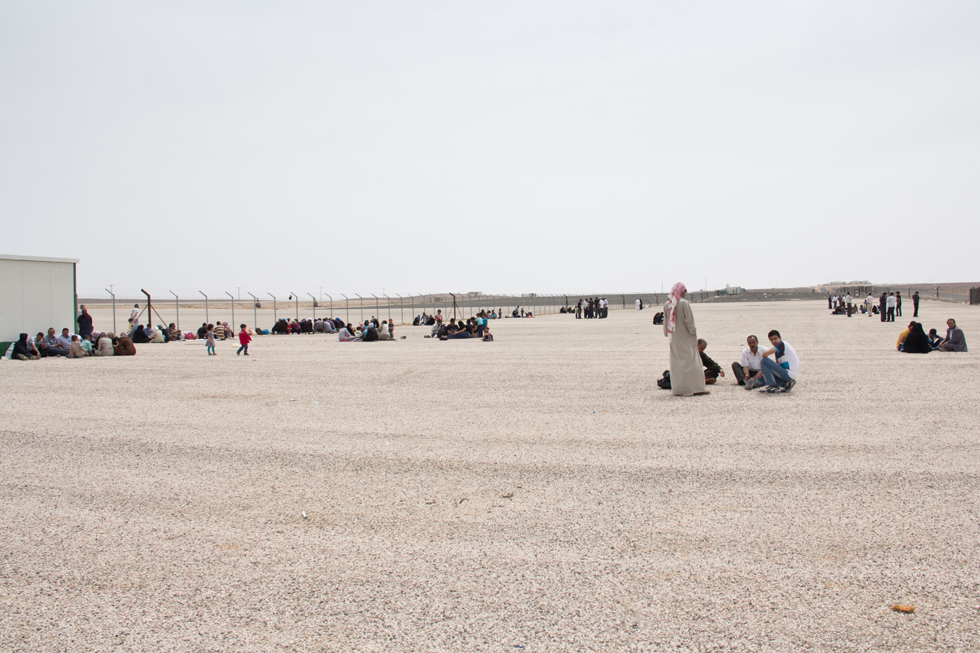
Syrian families gather in the visiting area to reunite with their families from outside the camp. Visiting times are Monday to Wednesday from 9 am – 3 pm.
عائلات سورية تتجمع في ساحة الزيارة مع أقاربهم الذين يسكنون خارج المخيم. الأوقات المخصصة للزيارة محددة من يوم الإثنين إلى يوم الأربعاء من الساعة التاسعة صباحاً إلى الساعة الثالثة بعد الظهر.
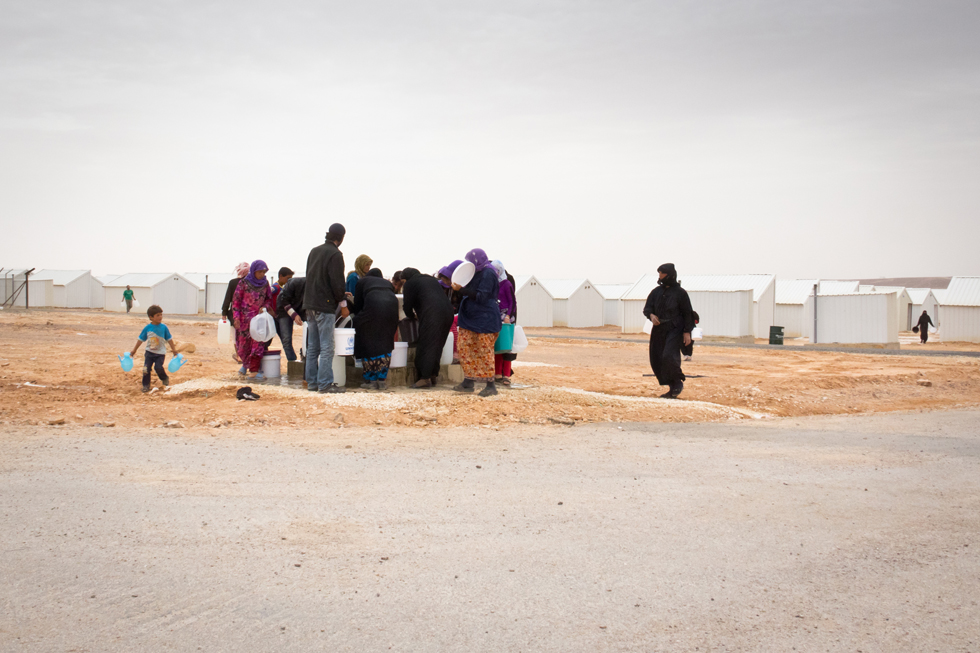
A group of people gather around the water fountain at 3 pm. Water at Azraq is available between 7 am- 11 am and 3 pm- 7 pm.
تجمع حول صنبور المياه الساعة الثالثة بعد الظهر. تتوفر المياه في المخيم بين الساعة السابعة إلى الساعة الحادية عشر صباحاً، ومن الساعة الثالثة إلى الساعة السابعة بعد الظهر.
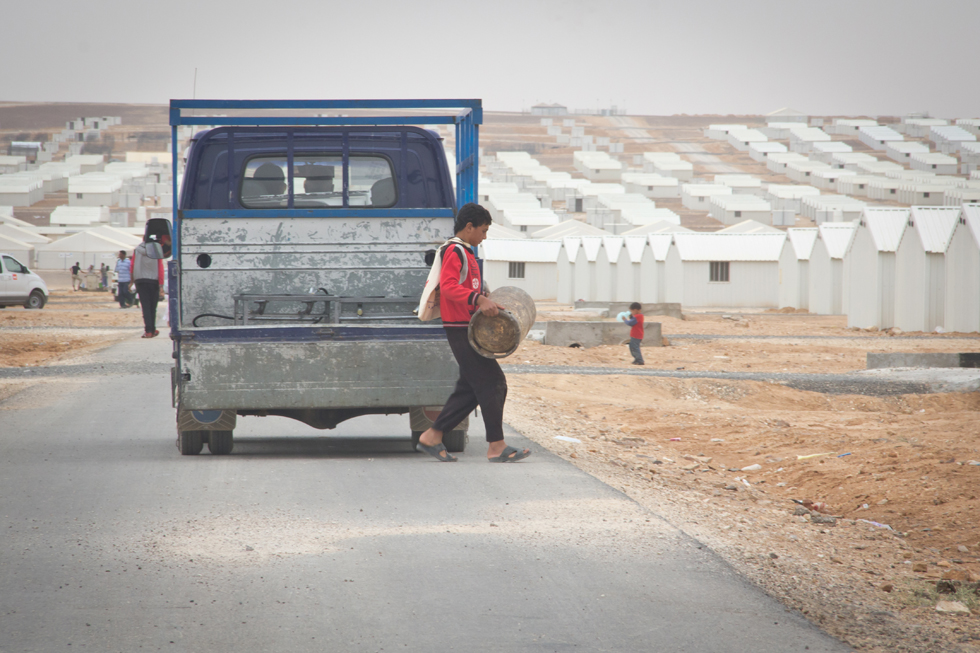
Young boy carrying a gas canister to take home.
فتى يحمل جرة غاز ليأخذها إلى البيت.
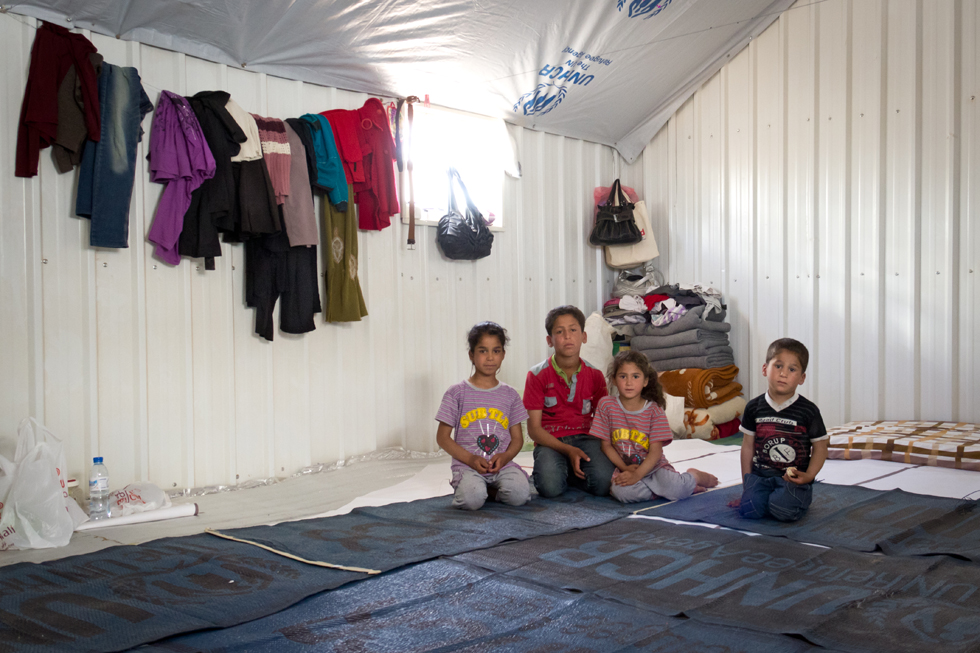 عمر، صفا، قاسم، مروى
عمر، صفا، قاسم، مروى
أبو قاسم: “أخدتنا الطريق حوالي أسبوع. أول مرة حاولت أطلع، سألني الجيش النظامي وين رايح. أنا مشكلتي بعرفش كيف أكذب، فقلتلهم اني رايح على الزعتري. سمعوا هيك وحطوني في غرفة وبلش الضرب، ضربوني تقريباً ساعة ونص، بعدين طلعوني برة عشان يشوفوني أولادي وأنا بينزل مني الدم، وبعدين يرجعوا ياخدوني ويكملوا ضرب،. المرة الثانية بس حاولنا نطلع خربت السيارة فينا بنص الصحراء، فمشينا مع الأولاد بالليل بين العقارب. بعد عشرين ساعة وصلنا الحمدلله… انهلكوا الأولاد.. وأنا لسه دوخان من الضرب. إذا بدك صوريهم ، بس دخيلكم لا تصوروني، اخواني لسه هناك.”
Omar, Safa, Qasem, Marwa
Abu Qasem: “It took us one week to get here. The first time I tried to leave Syria, I was stopped by a group of army men who asked me where I was going. My problem is that I don’t know how to lie, so I answered saying, “I’m going to Zaatari.” That’s when they took me into a room and beat me up for about an hour and a half. They then took me out of the room for my children [Omar, Safa, Qasem, Marwa] to see me beaten up, and then took me back to give me another beating, and it continued. The second time we tried to escape our car broke down in the middle of the desert. We had to walk in the middle of the night with the children.. but thank God we arrived 20 hours later. They’re exhausted, and I’m still dizzy from the beating. You can take their picture, but please, don’t take mine, my brothers are still there.”
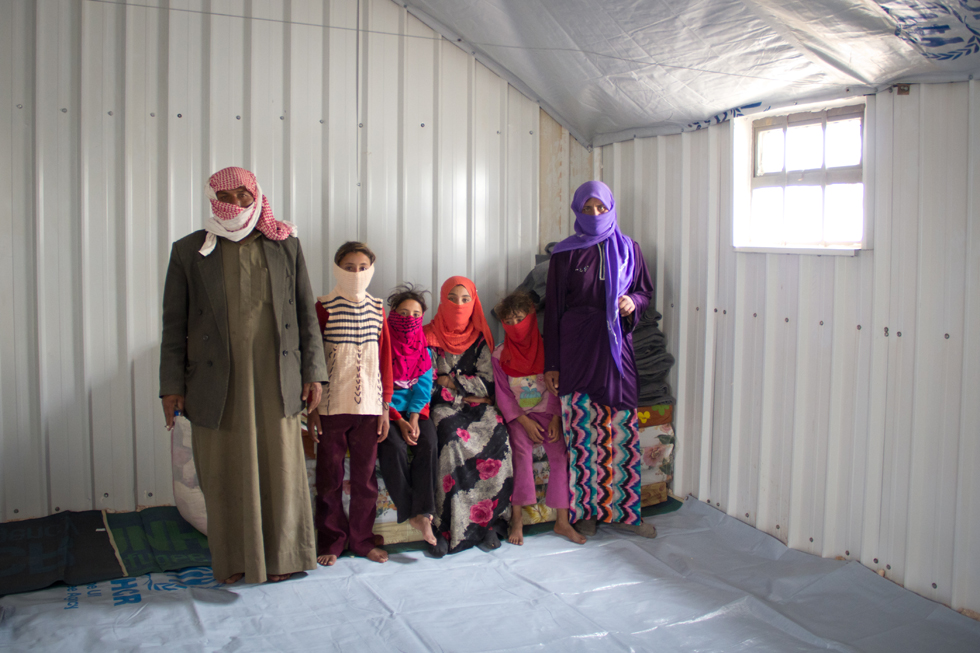
أبو تركي: “والله بتوقع سنتين. أظن منقعد سنتين قبل ما نرجع. خذوا صوروا بس أنا وكل العيله بدنا نغطي وجوهنا، الكل هناك بيعرف مين أبو تركي.”
Abu Turki: “Two years. I think we will stay here for two years before we go back. Take our pictures, but my family and I all need to cover our faces. Everyone back home knows who Abu Turki is.”
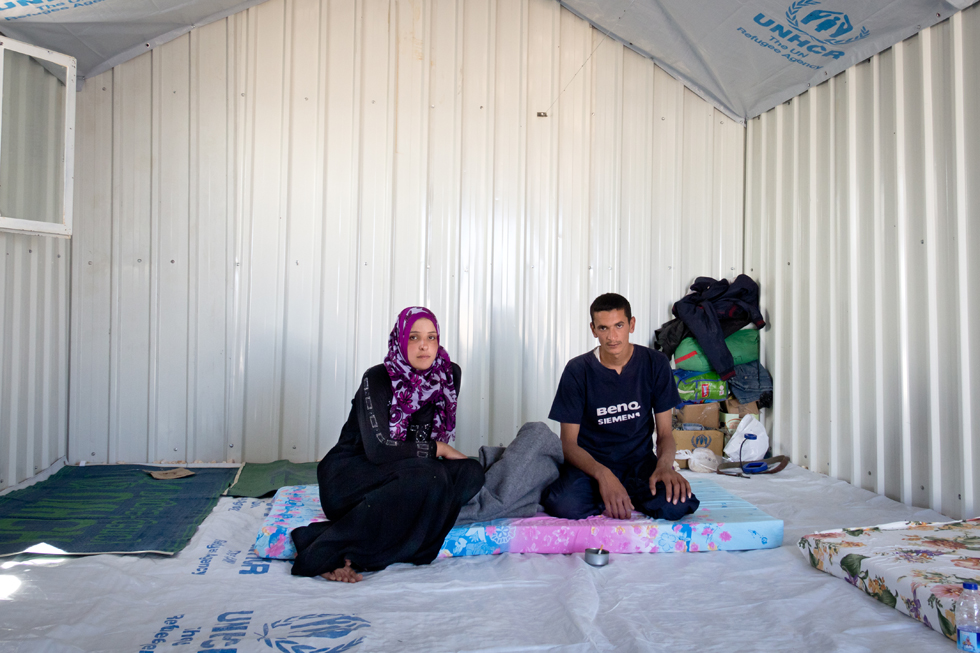
عبدالكريم وياسمين
عبد الكريم: تفرقنا ١٤ يوم عالطريق . مشيت يومين مع الشباب، لا أكل ولا دخان. انتظرتها عالحدود الأردنية ١٢ يوم حتى وصلت، هي عيلتي، حامل في الشهر الثامن.
Abdul Karim and Yasmine
Abdul Karim: “We were separated for 14 days. I walked for two days with the rest of the men, with no food or cigarettes. I waited for her at the Jordanian border for 12 days, and finally she arrived. She’s eight-months pregnant.”
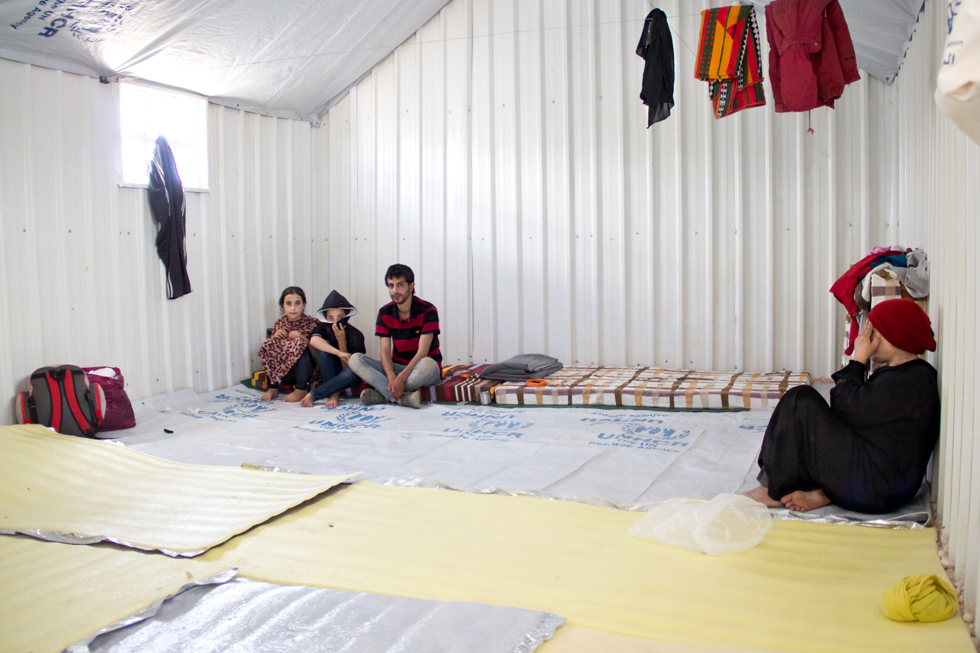
أم ميلاد، ميلاد، أحمد، آية
أم ميلاد : “زوجي ظل قاعد مع أمه هناك. أنا أخذت الأولاد واجيت فيهم هون على أساس أروح عند أهلي، بس جابوني لهون. بدي أقدم على لم شمل، كل أهلي في الزعتري. احنا ما عرفنا إنه هيك الوضع، ما توقعنا هيك، كان بدنا نكون في الزعتري.”
Um Milad, Milad, Ahmad, and Aya from Daraa
Um Milad: “My husband stayed behind to be with his mother. I took my kids and came here to be with my family, and instead they brought me to this place. My entire family is in Zaatari. I want to apply for a family reunification. We didn’t know it would be this way. We didn’t expect this. We wanted to be in Zaatari.”
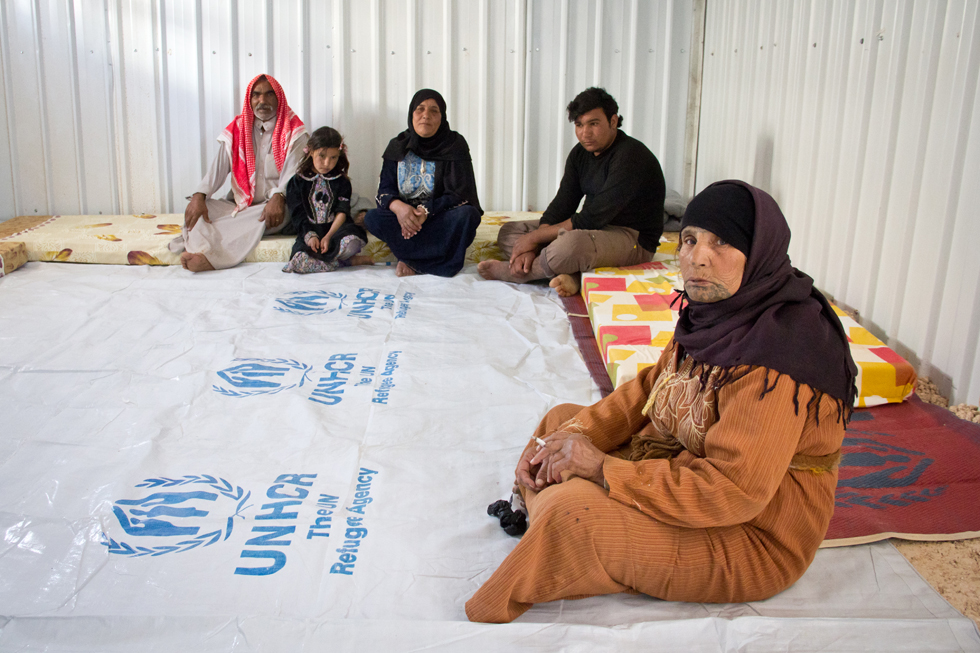
أم عيد جاءت مع عائلة ابنتها . استغرقت رحلتهم تقريباً أربعة أيام.
Um Eid arrived with her daughter’s family after a journey that took almost 4 days.
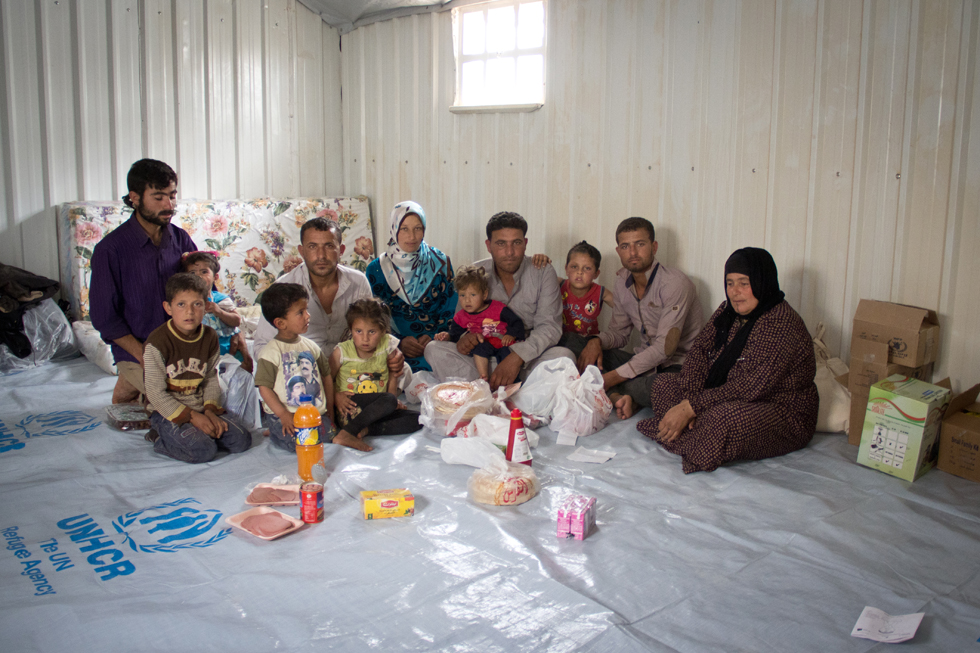
حسين وعائلته الممتدة كانوا قد وصلوا قبل ساعة من لقائنا بهم
حسين: “بعنا كل الاثاث عشان ندفع للسائق ياخذنا. كل واحد هون رفض يخدم مع الجيش النظامي، ما منقبل نقتل بعض احنا.”
Hussein with his extended family had arrived one hour before we met them
Hussein: “We sold all of our furniture to pay the driver the fees he asked for so he can get us here. Every man here refused to serve with the Syrian Army, none of us would accept killing each other.”
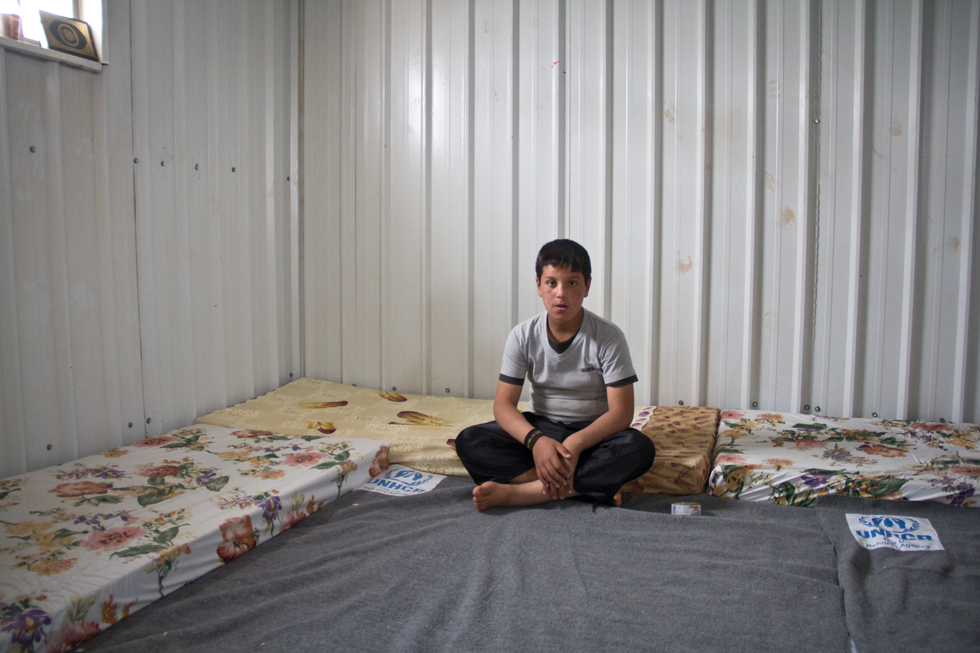
Fadi: “I was wounded, but my brother did not make it. The rocket landed in our house, and split him in half. He died a few days after, so we decided to come here.”
فادي : “أنا تصوّبت بس أخوي ما نفد. الصاروخ نزل على بيتنا وقسمه من النص قطع رجليه. ما قدر يتحمل ومات بعد كم يوم، فقررنا نيجي لهون.”
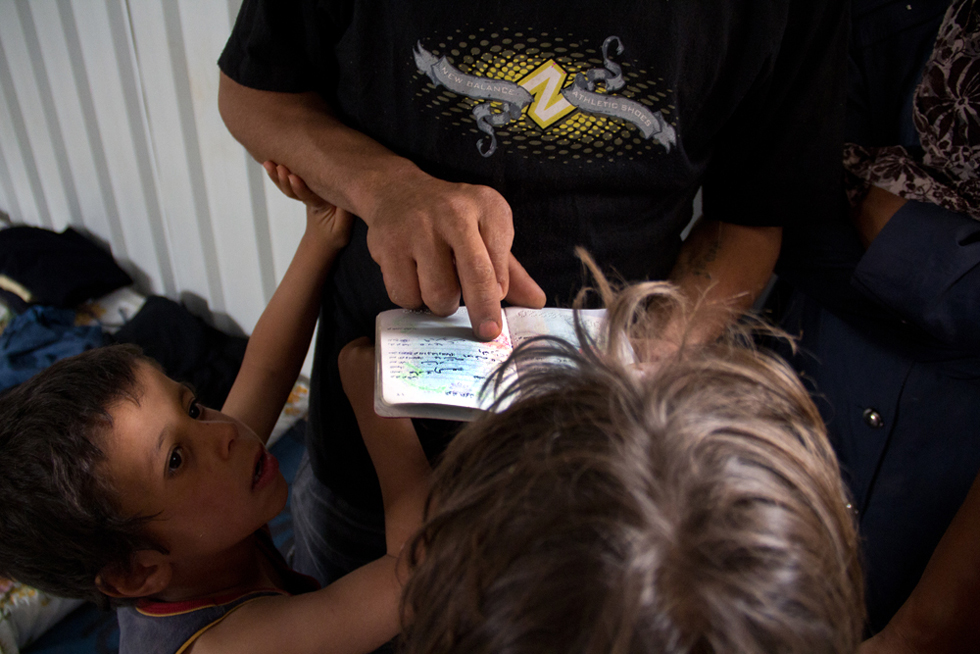
Bashar, Fadi’s father, holding the family document and showing us the name of his son Mohammad who was killed two weeks ago.
بشار، والد فادي، يحمل دفتر العائلة ويرينا اسم ابنه محمد الذي استشهد قبل أسبوعين.
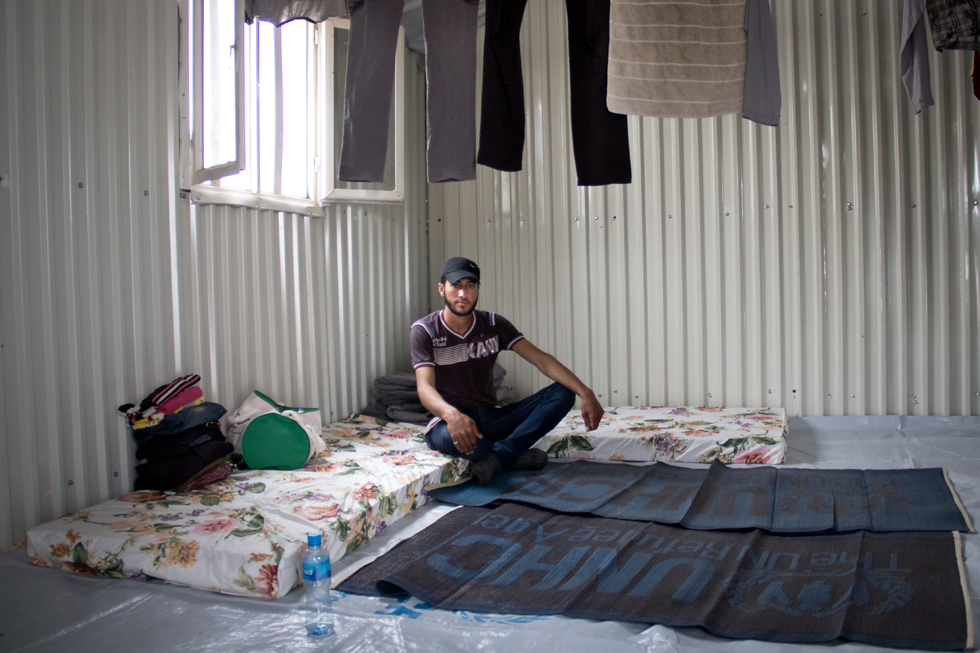
بشار: “وصلت على رباع السرحان بس رجعوني لأني كنت لحالي، فرجعت وأخذت أمي وحاولت مرة ثانيه عشان أدخل. وصلنا مبارح بس أمي بدها ترجع لأنه أخوي وأختي لسه في سوريا، وبقدرش أرجع معها لأني أنا رفضت أخدم في الجيش. بعرف كثير ناس رفضوا يفوتوا في الجيش، يا انحبسوا أو إعدام بثانية.”
Bashar: “I came to Raba’a Al Sarhan [a village 13 km to the North of Mafraq] but I was sent back because I was alone, so I went back home and took my mother with me and tried again. We arrived yesterday. But she wants to go back now; my little brother and sister are still in Syria. I just needed her to come with me so I can get in. I can’t go back to Syria with her because I refused to serve in the army. I know many people who refused to serve, they were put in jail or executed immediately.”
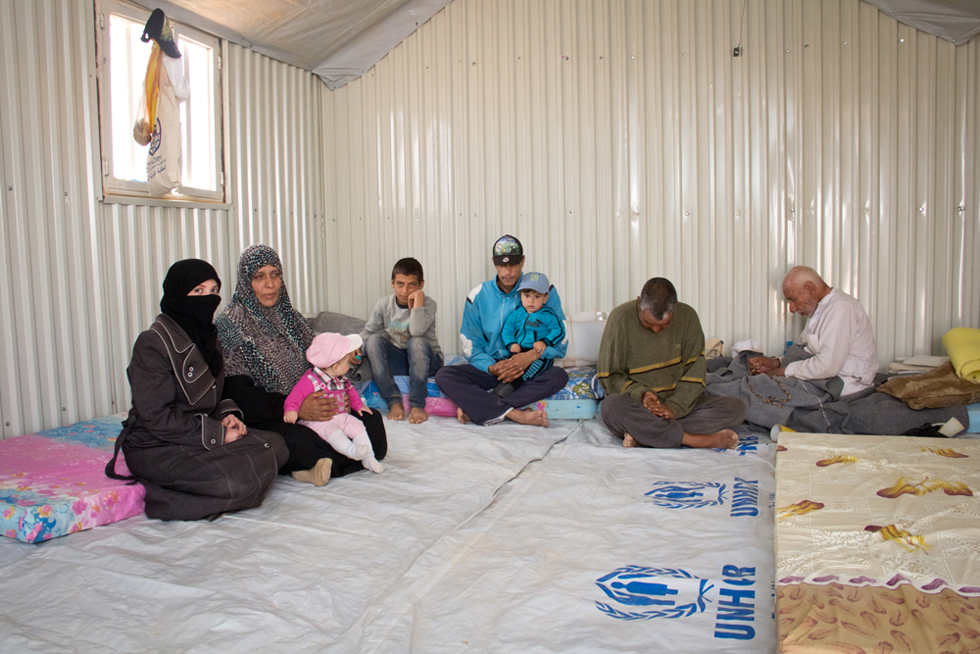
هدية: “اخذوا منا حوالي ٢١ ألف سوري على كل واحد عشان يوصلوني لهون. ابني حمل أبي على الطريق عشان رجله مقطوعة وما بيقدر يمشي عليها. أخي استشهد وتركلنا ١٠ أولاد، وأخي الثاني عنده إعاقة. كلنا جئنا مع بعض، وأنا اللي شايله كل همهم.
Hadiya: “We had to pay around 21,000 SYP each to get here. My son had to carry my father on his back because of his amputated leg. My brother was killed and left behind around 10 children, and my other brother is mentally ill. We all came here together, and I have to take care of them all.”
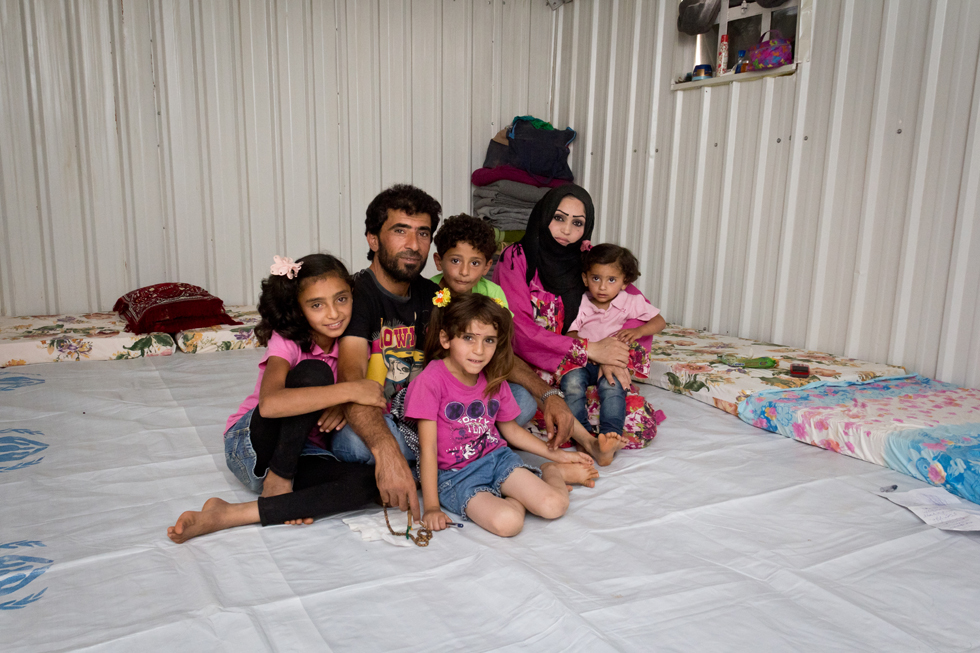
أيمن، نورا، صبا، نسرين، محمد، وسميرة
أيمن: “كان لازم نتفرق عالطريق. أنا طلعت مع الرجال وعيلتي (مرتي) أخذت الأولاد. قعدت ١٨ يوم أستناهم عالحدود، إنجنيت. في ناس بتمل وهي بتستنى وبتروّح، بس أنا ما قدرت. في يوم بلّشت افقد الأمل، أجت ست قالتلي عيلتك بتوصل بكرا، وصلوا بعد ٨ أيام. “
Ayman, Nora, Saba, Nisreen, Mohammad, and Samira
Ayman: “We had to split up to come here. I went with a group of men, and my wife went with the kids. I waited for them at the border for 18 days, I was losing my mind. There are people that get tired of waiting and go back, but I couldn’t. At one point as I began to lose hope, someone told me that my family will arrive tomorrow. Eight days later, they arrived.”
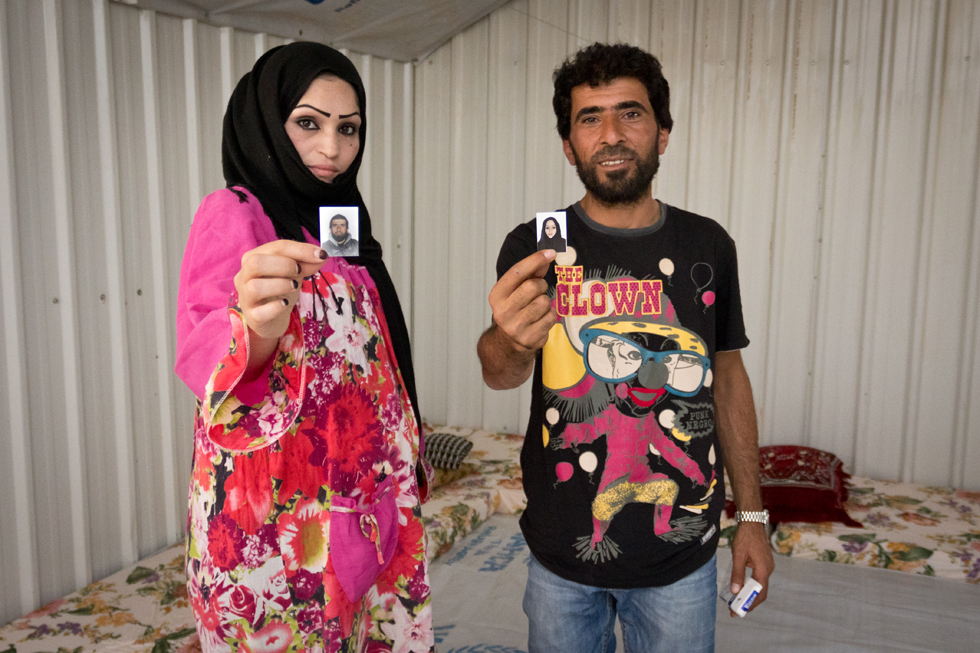
سميرة وأيمن
سميرة : “ما أخذت شيء معي غير جزداني وهالصور. كل ما ألاقي حد عالطريق كنت أفرجيهم صورته وأقول لهم إذا شفتوا زوجي قولوله اني عالطريق. هو كمان كان حامل صورتي وظل يسأل عني عالحدود.”
Samira and Ayman
Samira: “I took nothing with me but my purse, and his picture. I would show it to everyone and ask that if they saw my husband for them to tell him that I’m on my way. He carried my picture as well, and would ask about me at the border to everyone arriving.”